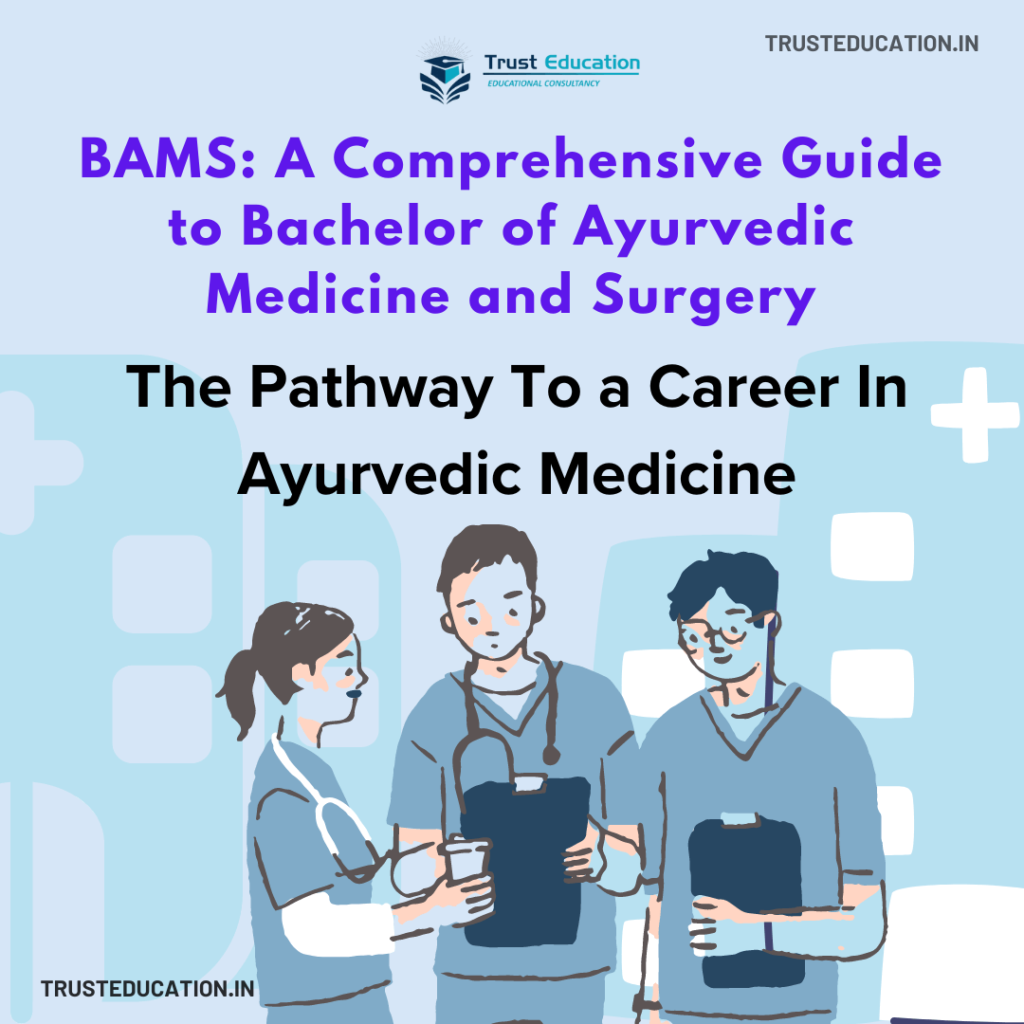
Understanding BAMS: The Pathway to a Career in Ayurvedic Medicine
BAMS (Bachelor of Ayurvedic Medicine and Surgery) is an integrated degree program in the field of Ayurveda, the ancient system of medicine rooted in the Indian subcontinent.
Ayurveda, which means “science of life,” is a holistic approach to health and wellness that focuses on maintaining a balance between body, mind, and spirit.
BAMS is designed for students who wish to pursue a career in this traditional yet increasingly relevant field of medicine.
With a growing global interest in alternative and holistic treatments, Ayurveda is gaining popularity not only in India but also across the world.
As a BAMS graduate, you will be equipped with the knowledge and skills to practice Ayurvedic medicine, contribute to healthcare, and even engage in research and development in the field.
This comprehensive guide explores the various aspects of the BAMS course, including its structure, eligibility criteria, career opportunities, and the future of Ayurvedic medicine.
What is BAMS?
BAMS is a professional degree that focuses on Ayurvedic medicine, combining traditional knowledge with modern medical practices.
The course typically spans five and a half years, including a one-year compulsory internship.
Throughout the program, students are trained in both theoretical and practical aspects of Ayurveda, along with exposure to modern medical subjects such as anatomy, physiology, pathology, and pharmacology.
The curriculum of BAMS is designed to provide a deep understanding of Ayurvedic principles, including the use of herbs, diet, and lifestyle modifications to treat and prevent diseases.
Students also learn about the various branches of Ayurveda, such as Kayachikitsa (General Medicine), Shalya Tantra (Surgery), Shalakya Tantra (ENT and Ophthalmology), and Kaumarbhritya (Pediatrics).
Eligibility Criteria and Admission Process
To pursue a BAMS degree, candidates must meet certain eligibility criteria, which generally include:
- Educational Qualification: The candidate should have completed their 10+2 education with Physics, Chemistry, and Biology as core subjects. A minimum aggregate score, typically around 50%, is required.
- Entrance Exams: Admission to BAMS is primarily based on performance in entrance exams such as NEET (National Eligibility cum Entrance Test). Some states and private universities may have their own entrance exams or admission criteria.
- Age Limit: The candidate should be at least 17 years old at the time of admission.
The admission process usually involves applying through a centralized counseling process based on NEET scores.
Candidates must carefully check the eligibility criteria and admission guidelines of the respective institutions they wish to apply to.
Course Structure and Curriculum
The BAMS course is divided into three professional courses, each focusing on different aspects of Ayurvedic education:
- First Professional Course: This stage covers the basic principles of Ayurveda, including the study of Sanskrit, Padartha Vigyan (Ayurvedic metaphysics), and Ashtanga Hridaya (a classical Ayurvedic text). Students also learn about modern subjects like Anatomy, Physiology, and Biochemistry.
- Second Professional Course: Here, the focus shifts to the study of Dravyaguna Vigyan (Ayurvedic Pharmacology), Rasa Shastra (Ayurvedic Pharmaceutics), Agada Tantra (Toxicology), and other related subjects. This phase emphasizes the understanding of various Ayurvedic formulations and their therapeutic uses.
- Third Professional Course: The final stage involves advanced study in Kayachikitsa, Shalya Tantra, Shalakya Tantra, and Kaumarbhritya. Students also undergo practical training in Panchakarma (detoxification therapies) and are introduced to modern medical practices relevant to their field.
Internship and Practical Training
After completing the academic portion of the BAMS course, students must undergo a one-year compulsory internship.
This internship is a crucial part of the program, as it provides hands-on experience in diagnosing and treating patients under the supervision of experienced practitioners.
The internship is typically divided into different departments such as medicine, surgery, gynecology, and pediatrics, allowing students to gain comprehensive practical knowledge.
During the internship, students also get the opportunity to work in Ayurvedic hospitals, clinics, and wellness centers, which helps them build confidence and develop the skills necessary to practice independently.
The internship experience is invaluable in bridging the gap between theoretical knowledge and real-world application.
Career Opportunities After BAMS
A BAMS degree opens up a wide range of career opportunities in both the public and private sectors.
Some of the prominent career paths include:
- Ayurvedic Practitioner: As an Ayurvedic doctor, you can set up your own practice or work in Ayurvedic hospitals and wellness centers. You will be responsible for diagnosing patients, prescribing Ayurvedic treatments, and promoting holistic health.
- Research and Development: With a growing interest in natural and holistic treatments, there is a demand for research in Ayurvedic medicine. BAMS graduates can work in research institutes, pharmaceutical companies, or academic institutions to contribute to the development of new Ayurvedic formulations and therapies.
- Teaching and Academia: If you have a passion for teaching, you can pursue a career in academia by joining Ayurvedic colleges as a lecturer or professor. With further qualifications such as MD (Ayurveda) or PhD, you can advance to higher academic positions.
- Ayurvedic Pharmacist: You can work as a pharmacist in Ayurvedic pharmacies, involved in the preparation and dispensing of Ayurvedic medicines. There are also opportunities in the manufacturing and quality control of Ayurvedic products.
- Health and Wellness Tourism: With the rise of wellness tourism, there is a growing demand for Ayurvedic specialists in resorts, spas, and wellness retreats. BAMS graduates can work as consultants, providing personalized Ayurvedic treatments to clients from around the world.
- Government Jobs: BAMS graduates are eligible for various government positions in the healthcare sector, such as Ayurvedic Medical Officer, Drug Inspector (Ayurveda), and roles in the Ministry of AYUSH (Ayurveda, Yoga & Naturopathy, Unani, Siddha, and Homoeopathy).
Challenges and Future Prospects in Ayurvedic Medicine
While a career in Ayurvedic medicine offers many opportunities, it also comes with its own set of challenges.
One of the primary challenges is the need to balance traditional practices with modern scientific approaches.
The integration of Ayurveda with evidence-based medicine is crucial for its global acceptance and wider application.
Another challenge is the commercialization of Ayurveda, which sometimes leads to the dilution of its core principles.
Practitioners must stay true to the essence of Ayurveda while adapting to contemporary healthcare needs.
Despite these challenges, the future of Ayurvedic medicine looks promising.
With increasing awareness about the benefits of natural and holistic treatments, there is a growing demand for Ayurvedic practitioners and products.
Additionally, the government’s support for AYUSH systems in India and the global shift towards preventive healthcare are likely to drive the growth of the Ayurveda sector.
Is BAMS the Right Choice for You?
Choosing a career in BAMS can be a fulfilling and rewarding experience if you have a genuine interest in holistic medicine and a passion for helping others achieve wellness.
The course offers a unique blend of traditional Ayurvedic knowledge and modern medical science, providing a solid foundation for a career in healthcare.
As a BAMS graduate, you will be part of a growing community of practitioners who are dedicated to promoting health through natural and holistic means.
Whether you choose to practice, teach, research, or work in the wellness industry, a BAMS degree equips you with the skills and knowledge to make a meaningful impact on the health and well-being of individuals and communities.
If you are drawn to the principles of Ayurveda and are committed to lifelong learning and growth in the field, BAMS can be an excellent choice for your professional journey.
With the right attitude, dedication, and support, you can build a successful and satisfying career in Ayurvedic medicine.
